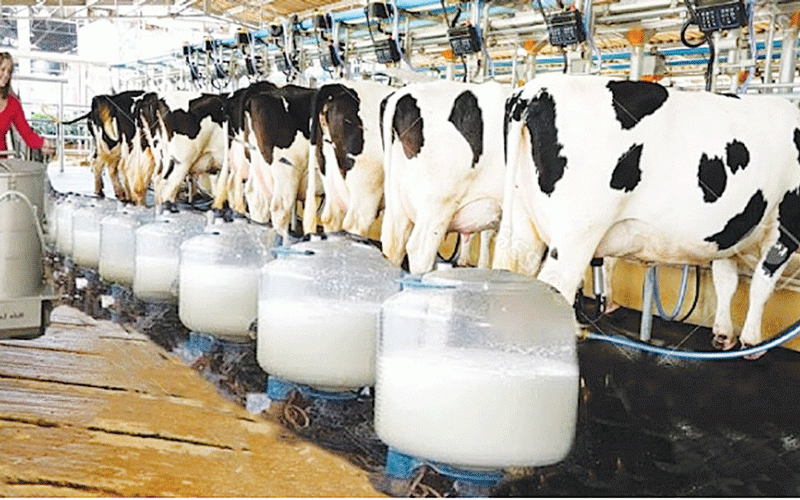The Zimbabwe Treasury Department’s move to slash fees and scrap permits in the livestock and dairy sectors is far more than a symbolic policy gesture. It is a bold pivot, and a commendable one at that, because it alleviates a lot of “pains," both bureaucratic and financial, that have long hobbled progress in this crucial industry.
At first glance, it may appear as a narrow intervention confined to livestock and dairy, but when one zooms out, it offers a window into the broader malaise of Zimbabwe’s regulatory environment, as well as a possible blueprint for dismantling the suffocating web of red tape strangling enterprise across the economy.
The reforms feed seamlessly into the Dairy Revitalisation Programme launched back in 2017, which set the ambitious target of pushing milk production to 200 million litres annually. Current national requirement stands at 131 million litres per year, so if the target is met it means the country becomes self sufficient in terms of milk output.
That goal has always been technically achievable seeing as that Zimbabwe has the climate, land, and human capital. However, it has been persistently undermined by excessive compliance costs, fragmented bureaucracy, and systemic inefficiencies, among many internal undesirables, all which militate against both expansion and investment.
With that as a backdrop, these removal of fees and permits in the sector, coupled with the long-awaited abolition of ZINWA abstraction charges, directly addresses one of the key constraints flagged by farming representative bodies for years: affordable and reliable access to water. In agriculture and livestock production, water is not just a utility; it is the very lifeblood of productivity. By eliminating water abstraction levies, the Zimbabwe Treasury Department has untangled a knot that frustrated countless farmers who were effectively penalised for using water to sustain their herds and output.
Yet the opportunity here goes further. Lower compliance costs in dairy are not merely a matter of giving farmers breathing room but also recalibrate the risk-reward equation for investors. The sector envisages a scenario where reduced barriers not only strengthen existing local players but also tilt the sector toward foreign investment.
Zimbabwe’s dairy industry currently runs a wide gap between domestic demand and local supply, forcing reliance on imports, particularly powdered milk. Raw milk production in 2024 reached a record high of 114.7 million liters, surpassing the national target of 113 million liters back then. With these reforms cutting operational friction, the self sufficiency target is on track to be met and global dairy groups and cross-border agro-investors could see a clearer path to enter the Zimbabwe market as well and/or scale operations currently underway in the country.
Growth in output will more than plug supply gaps, but also potentially create downstream industries ranging from diversified local dairy products, and benefit to other non-dairy sectors like packaging and distribution. In short, the ripple effects are anticipated to be substantial.
Of course it's not lost on us that these are bureaucratic improvements and do not touch most structural and politically sensitive issues, like land tenure in agriculture. Fees and permits are being dismantled in dairy, questions around title security and the long-term framework for land ownership remain uncertain and the air is thick with possibilities of change 5 or 10 years down the line - all which brings uncertainty to long term planning.
That said, lest we allow ourselves to be swept away by seeking negativity in all positives, we all are happy with these steps in the right direction. Be that as it may, one must, in the same token, also confront the broader reality of red tape in Zimbabwe. Almost every sector in the country is afflicted by the same bureaucratic sclerosis that dairy has only just begun to shed. And if we are honest, the stakes are enormous: can Treasury’s bold experiment with livestock be scaled across the economy, or will this be another well-meaning reform stranded in isolation?
Consider, as a classic example, the transport sector. It remains one of the most glaring victims of regulatory overreach in the country. Commercial operators must negotiate a labyrinth of licensing requirements that force them through multiple government agencies, each demanding excessive documentation, fees, and approvals. The result is predictable: delays, missed opportunities, and higher operating costs that are inevitably passed on to consumers. High road-user fees and tolls add to this cocktail of inefficiencies, turning what should be a basic logistical function into a costly ordeal.
The story does not end there. Vehicle inspection processes remain firmly in the chokehold of the Vehicle Inspection Department (VID), which is so constrained and under-resourced that it has become a bottleneck to fleet expansion and timely compliance. No one can convince me that this VID function can not be efficiently and affordably outsourced to private players!
Private-sector deregulation of inspections will not only create more efficiency, but will improve safety standards if they are given reporting portals to non-compliant/expired safety certificates (which I know they will pursue vigorously as compliance pays these entities directly). The country can't continue to cling to this "government only" outdated arrangement that slows down operators and limits growth.
The overlapping mandates of regulatory bodies in transport further illustrate the maddening complexity that business must endure. Between ZINARA, VID, ZimPost, the Zimbabwe Broadcasting Corporation (which still somehow collects licensing fees), insurance companies, and the Ministry of Transport, a transport operator must perform a bureaucratic temple run worthy of a mobile game. Each institution imposes conflicting or redundant regulations, creating compliance confusion and escalating administrative burdens, not to mention the opportunity cost of time wasted.
Border operations bring their own set of headaches. Ask any trucking company about clearing vehicles at customs, and you will likely hear war stories about glacial processing times, inconsistent application of procedures, and the punitive unpredictability of cross-border permits. Then there's the Zimbabwe Revenue Authority’s presumptive tax which is an unfathomable enigma in itself, often misunderstood even by those obliged to pay it.
And once inside the urban environment, operators face restrictive municipal laws that change regularly, one week banning certain routes, the next hiking parking fees, creating a pattern of uncertainty that undermines planning and increases costs.
The list, frankly, is endless, and this is just one sector - transport. The same suffocating bureaucracy plays out in retail and wholesale, in food and beverage services, in accommodation and tourism, in construction and building materials. Individual challenges differ in detail but share the same DNA: overlapping government departments, regulatory inefficiencies, contradictory rules, and structural barriers.
The bottom line is clear: Zimbabwe has unwittingly created a high-compliance business environment that suffocates operational efficiency and stifles sectoral growth. Every licence, every form, every approval costs not only money but momentum. And yet, when we see Treasury dismantling that edifice, even in one sector, we are right to get excited. It is not just the technical implications of reduced fees; it is the signal that government finally acknowledges the crushing weight of bureaucratic regulation and is prepared to confront it head-on.
The real test, however, lies ahead. Professor Mthuli Ncube and his Treasury team have thrown down a marker with these changes in dairy farming. They have shown intent, and the response from stakeholders has been positive. But Zimbabwe’s economy does not need intent; it needs execution. Policy reforms will only matter if they are implemented in a way that holds across ministries, cuts across industries, and outlasts political cycles. The Treasury has opened the door to reform and now other ministries, regulators, and parastatals must carry the torch forward.
The Zimbabwean business climate has for too long been a paradox: enormous natural and human resource potential suffocated by an undergrowth of bureaucracy, among other matters. Fixing that paradox could be the single most important economic reform of the decade. Dairy farmers may be the first beneficiaries, but the hope, and indeed the challenge, is to ensure they are not the last.


